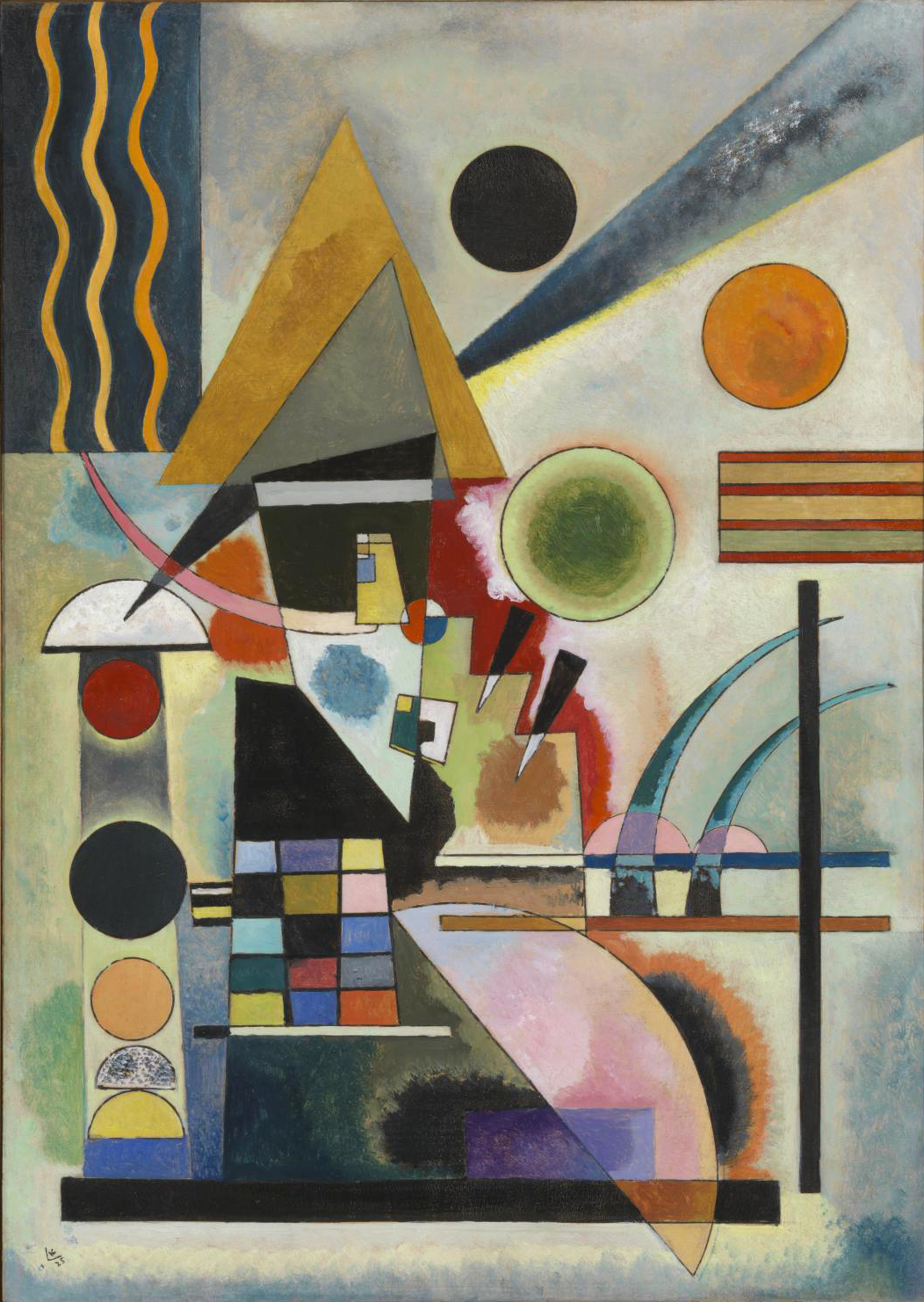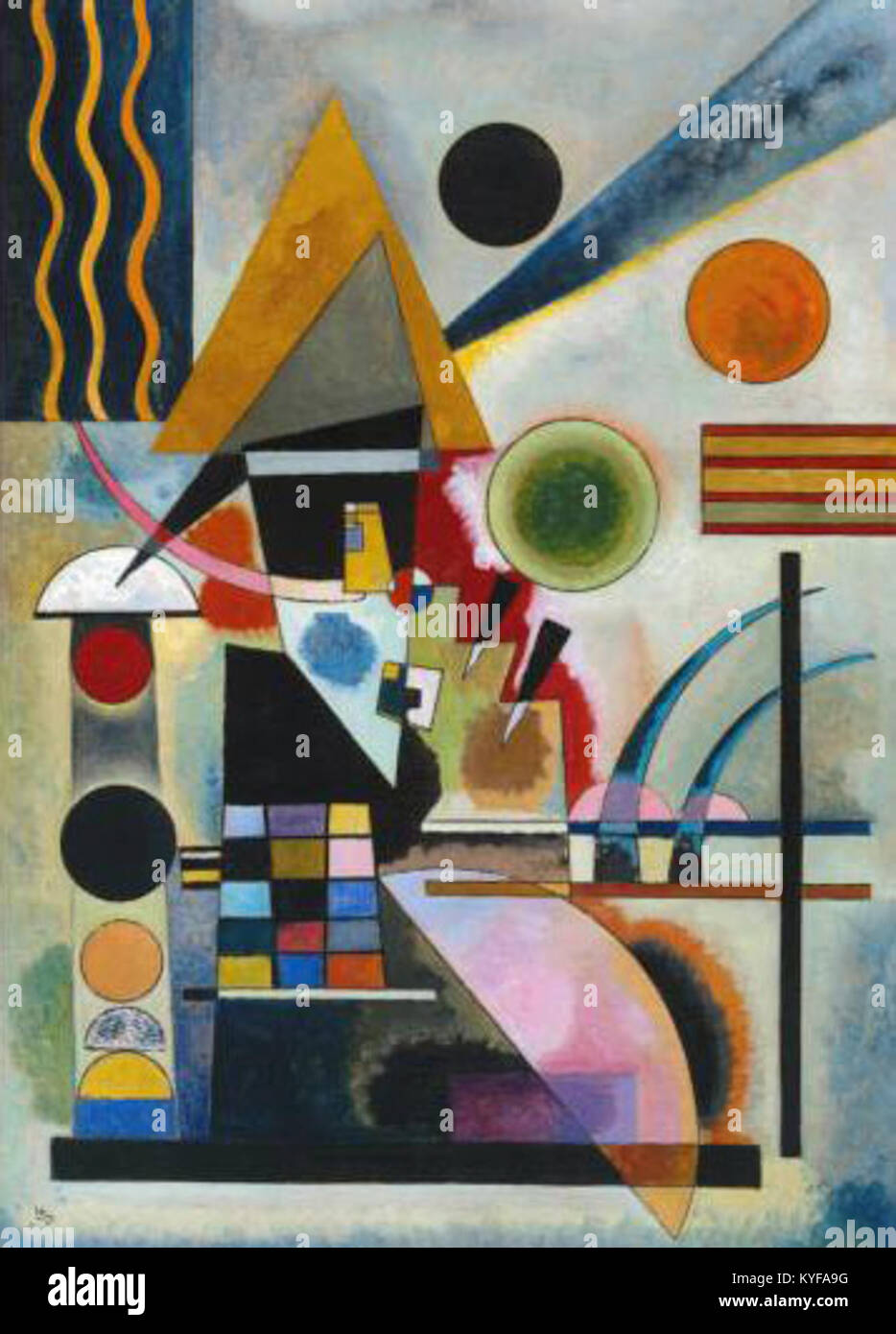Wassily Kandinsky — Sign, 1925

tutorial famous paintings in miniature Kandinsky's Swinging 1925 Miniature art, Miniatures
Swinging ( link) is an oil painting by Wassily Kandinsky made in 1925 and acquired by the Tate in 1979. The title ".conveys the painting's sense of dynamic movement, suggestive of the rhythms of modernity." In many ways Kandinsky, a pioneer of abstract painting, could relate to digital artists.

Painting "On White II" (1923) Wassily Kandinsky
VDOMDHTMLtml> Wassily Kandinsky - Swinging - Tate Modern - London - December 2019 - YouTube Wassily Kandinsky: https://www.tate.org.uk/art/artists/wassily-kandinsky-1382 Tate Modern:.

Køb håndmalet reproduktion af 'Swinging' af Wassily Kandinsky
Swinging, Wassily Kandinsky, 1925 | Tate Images Wassily Kandinsky 1866-1944 Swinging 1925 Add to lightbox Buy a personal print Artwork Details Classification: painting Medium: Oil paint on board Dimensions: support: 705 x 502 mm Provenance: Purchased 1979 Image ID #: T02344 Accession #: T02344 Credit Lines

Wassily Kandinsky — Swinging, 1925
1925 Tate: Purchased 1979 Object Light exhibition highlights On display Wassily Kandinsky (1866-1944) wanted his art to go beyond straightforward representation, giving viewers a more participatory experience, like listening to music. He aimed to create a sense of movement in his work and saw colour as an essential tool in this.

Wassily Kandinsky — Clear Connection, 1925
painting by Wassily Kandinsky (Museum: Tate Modern). Swinging is an artwork on USEUM. It was created by Wassily Kandinsky in 1925. Log in to USEUM to download unlimited free images, send e-cards and interact with thousands of famous paintings, drawings and illustrations.

Wassily Kandinsky — Sign, 1925
Wassily Kandinsky's art can be often perceived as highly contrasting in color and very chaotic. Kandinsky championed a mystical approach to art.. Swinging. Oil paint on board • 70.5 x 50.2 cm. Wassily Kandinsky 1925 Wassily Kandinsky's art can be often perceived as highly contrasting in color and very chaotic..

Vassily Kandinsky, 1925 Swinging Stock Photo Alamy
1925 Image released under Creative Commons CC-BY-NC-ND (3.0 Unported) License this image On loan Nakanoshima Museum of Art (Osaka, Japan): Light Artist Wassily Kandinsky 1866-1944 Original title Schaukeln Medium Oil paint on board Dimensions Support: 705 × 502 mm frame: 954 × 750 × 80 mm Collection Tate Acquisition Purchased 1979 Reference T02344

Save to Pinterest Kandinsky art, Wassily kandinsky, Kandinsky
1925 Oil on cardboard 27.2 × 19.3" (69.0 × 49.0 cm) Los Angeles County Museum of Art More from 1925 Small Dream In Red In Blue One Spit Yellow-Red-Blue In the Bright Oval Parallel Diagonals Swinging All Around Clear Connection Green and Red Above and Left Delicate Soul Blue over Multicolored Descent Blue Circle II Three Elements Brown Silence

Swinging no291 1925 Stretched Canvas Wassily Kandinsky (24 x 36)
Swinging appears right between two notable periods of his style, the former being the architectural period—when his use of shapes became more precise than before—and the latter being the romantic period—when softer colors and concrete, natural images came into the fold.

"Balancement (Swinging)" by Wassily Kandinsky created in 1925 Tablolar, Wassily kandinsky, Boya
1866-1944 Swinging 1925 License this image Biography Wassily Wassilyevich Kandinsky ( VASS-il-ee kan-DIN-skee; Russian: Василий Васильевич Кандинский, tr. Vasiliy Vasilyevich Kandinskiy, IPA: [vɐˈsʲilʲɪj vɐˈsʲilʲjɪvʲɪtɕ kɐnʲˈdʲinskʲɪj]; 16 December [O.S. 4 December] 1866 - 13 December 1944) was a Russian painter and art theorist.

Wassily Kandinsky Bild "Im Blau" (1925), gerahmt ars mundi
Wassily Kandinsky Swinging (1925) Tate Naum Gabo Construction in Space: Diagonal (1921-5, reassembled 1986. The Russian constructivist painters Wassily Kandinsky and Kasimir Malevich and the sculptor Naum Gabo were pioneers of non-objective art. It and was inspired by the Greek philosopher Plato who believed that geometry was the highest.
Stephanie Guy Fine Art Tutorial Kandinsky's Swinging Schaukeln 1925 in Miniature
Wassily Kandinsky >The Russian painter and graphic artist Wassily Kandinsky. When, in 1925, the Bauhaus moved to Dessau, Kandinsky moved with it. In 1926 he published the principles of his teaching in Punkt und Linie zur Fläche(Point and Line to Plane). His art from about 1920 to 1924 has been defined as his architectural period. The shapes.

Painting "Improvisation 26 (Rowing)" Kandinsky
Metadata Size of this preview: 433 × 599 pixels Other resolutions: 173 × 240 pixels | 347 × 480 pixels 555 × 768 pixels 1,110 × 1,536 pixels (1,110 × 1,536 pixels, file size: 219 KB, MIME type: image/jpeg Captions Add a one-line explanation of what this file represents date QS:P571,+1925-00-00T00:00:00Z/9 dimensions QS:P2048,+50.2U174728

Wassily Kandinsky / Schwarze Spannung 1925 Wassily kandinsky, Abstract, Museum of modern art
by Tom Gurney Tom Gurney BSc (Hons) is an art history expert with over 20 years experience Published on June 19, 2020 / Updated on October 14, 2023 Email: [email protected] / Phone: +44 7429 011000 Swinging dates from 1925 and is one of the few artworks from Kandinsky to be found within the collection of the Tate Modern in London, UK.

Design is fine. History is mine. — Wassily Kandinsky, Schaukeln Swinging, 1925. Via...
Wassily Kandinsky (1866-1944) was a Russian painter who visualised musical compositions with abstract forms and colours. His intricate and dynamic works of art combined colour and spontaneous shapes. He once wrote, "Colour directly influences the soul. Colour is the keyboard, the eyes are the hammers, the soul is the piano with many strings".
Stephanie Guy Fine Art Tutorial Kandinsky's Swinging Schaukeln 1925 in Miniature
Swinging. 1925. Geometric abstraction. Oil on board. 19.7 × 27.6" (50.0 × 70.0 cm) London, Tate.. therefore, despite any resemblance to a "swinging arm" or a figure made from the mass to the bottom left, they aren't meant to represent anything. The artist has sought to inspire in the viewer the feeling of swinging -- not through the visual.